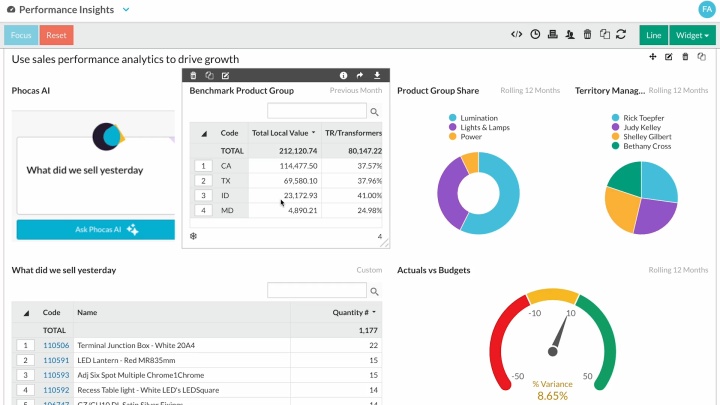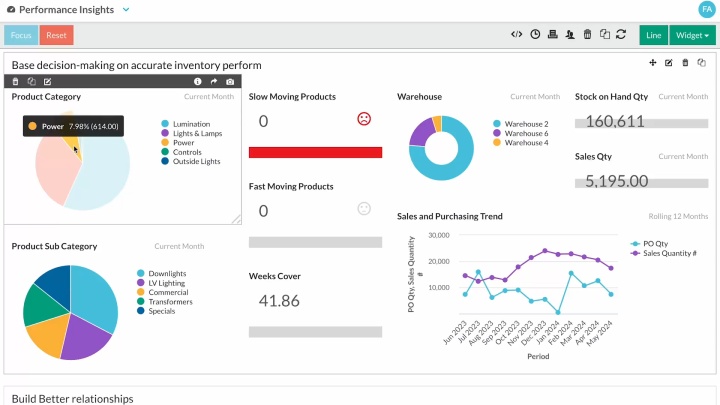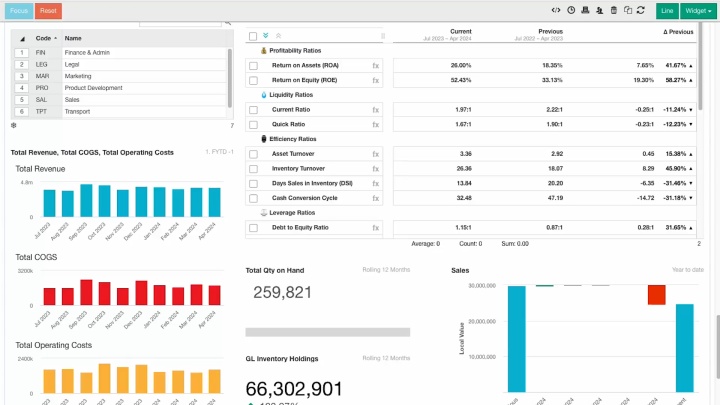Understand performance at every level of your business

Go deep into your financial performance
With Phocas Budgets & Forecasts and Financial Statements you integrate your data, planning and reporting across your organization so results are easily monitored.
- Compare live actual performance against planned budget figures and make timely adjustments
- Review financial KPIs over time with easy access to current and historical financial statements
- See side by side snapshots of current financial performance for all branches, regions and products
- Drill down into transactional source data for performance variances.

Use sales performance analytics to drive growth
What did we sell today, what didn’t we sell today? Slice and dice your data by sales rep, product or region in a few clicks or use natural language queries with Phocas AI.
- Share insights and benchmark across branches
- Check sales actuals against budget to monitor performance
- Nurture a data-driven culture across your sales team

Base decision-making on accurate inventory performance analysis
Use stock and sales figures to monitor your inventory in Phocas so you know where to allocate your resources. Improve cash flow, reduce dead stock and make every aspect of your operations more efficient.
- Get a clear view on inventory performance by tracking key metrics
- Identify fast and slow moving inventory across category & sub-category
- Calculate your stock coverage in days to compare against lead times
- Share inventory dashboards for a high-level view of what’s happening.

Build better relationships using supplier performance metrics
Maintain an efficient supply chain by calculating supplier performance metrics with Phocas Analytics. Transparency of the performance numbers keeps suppliers in check.
- Use analysis to negotiate better terms and compare suppliers
- Measure DIFOT and determine if suppliers are delivering late or not in full
- Use data insights to help suppliers understand your needs and expectations.

Demand planning boosts profitability
Caprice achieved greater efficiencies in vendor-managed inventory with Phocas. They now place fewer orders, avoid costly last-minute requests, and have significantly reduced stock movement between locations, helping to keep costs down and making overstock returns a thing of the past.

Customize performance dashboards to suit your business
Unlimited dashboards in Phocas get more people in your organization visualizing financial, sales and operational performance. Sharing charts or graphs this way communicates insights and drives data-based decisions.
- Build financial statement dashboards to demonstrate the performance of your strategy
- Allow stakeholders to review overall performance or filter to one division via dashboards
- Phocas dashboards help more people understand the numbers which leads to a stronger performing business

Let people visualize and own their performance
More visibility of financial performance through dashboards means better conversations between teams and accountability of people’s individual performance.
- See what you need with security and permission controls
- Self-serve reporting tools are easy to use
- At-a-glance sparklines represent all your finance information
- Chart performance with one click and view the big picture

Bring all your data and your people together with one platform
Everyone can access the performance analytics they need
- Get performance metrics specific to your business or job role. Whether it's a high level view or how each of your branches are tracking, see it all on a Phocas dashboard.
- Empower all your people to be data-driven. No more waiting for finance to pull ad-hoc reports, everyone does it themselves with AI or a few clicks in the Phocas grid.
- Everyone feels good because they have time to focus on what matters.

The Planning Survey 24, BARC
See how Phocas performed in the world's largest business planning survey from BARC
Download nowFrequently asked questions
Performance analytics focuses on analyzing and evaluating the performance of various aspects of your business. It involves collecting, interpreting, and presenting data to understand how well finance, sales and operations are performing and to identify areas for improvement.
Performance analytics involves analyzing metrics related to your operations so you can gauge the effectiveness of your strategies. This can include metrics such as revenue growth, inventory lead times, supplier productivity, and operational efficiency.
A financial planning and BI platform helps to consolidate all the data, to obtain performance insights and share them across your business.
Performance analytics provides your business with comprehensive data and insights to make informed decisions. By analyzing performance metrics you can identify risks and opportunities early and make accurate decisions to your advantage.
Performance analytics helps align your people with strategic goals. By tracking performance metrics that are linked to organizational priorities, everyone can focus on achieving their targets.
Business analytics tools are software platforms designed to analyze and interpret data to support decision-making and improve business performance. These platforms can be generalist or made for specific industries such as Phocas business planning and analytics that is designed for analyzing manufacturing, distribution and retail businesses. Phocas is built on a BI platform so consolidates all your data from your ERP and other data sources. The platform also supports financial reporting and analysis as well as budgeting and forecasting so all your financial and operational performance can be calculated and visualized together.
Understand the past, operate better today, and plan well for the future







